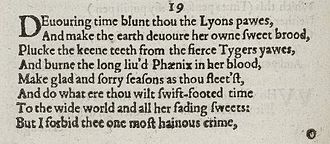Our website is made possible by displaying online advertisements to our visitors.
Please consider supporting us by disabling your ad blocker.
Sonnet 19
| Sonnet 19 | |||||||
|---|---|---|---|---|---|---|---|
 The first two stanzas of Sonnet 19 in the 1609 Quarto | |||||||
| |||||||
Sonnet 19 is one of 154 sonnets published by the English playwright and poet William Shakespeare in 1609. It is considered by some to be the final sonnet of the initial procreation sequence. The sonnet addresses time directly, as it allows time its great power to destroy all things in nature, but the poem forbids time to erode the young man's fair appearance. The poem casts time in the role of a poet holding an “antique pen”. The theme is redemption, through poetry, of time's inevitable decay. Though there is compunction in the implication that the young man himself will not survive time's effects, because redemption brought by the granting of everlasting youth is not actual, but rather ideal or poetic.[2]
- ^ Pooler, C[harles] Knox, ed. (1918). The Works of Shakespeare: Sonnets. The Arden Shakespeare [1st series]. London: Methuen & Company. OCLC 4770201.
- ^ Shakespeare, William. Duncan-Jones, Katherine. Shakespeare’s Sonnets. Bloomsbury Arden 2010. ISBN 9781408017975. p. 148
Previous Page Next Page


